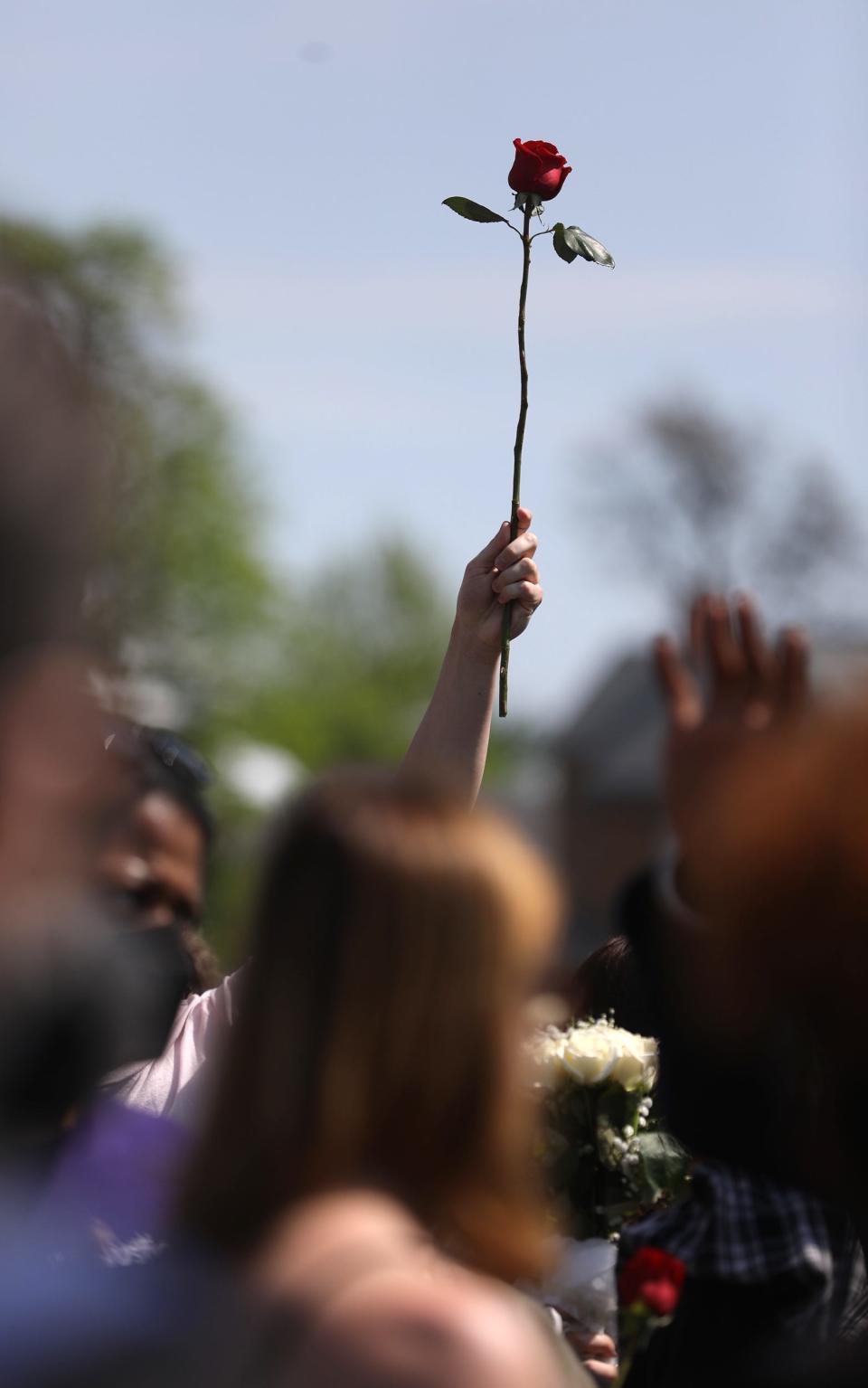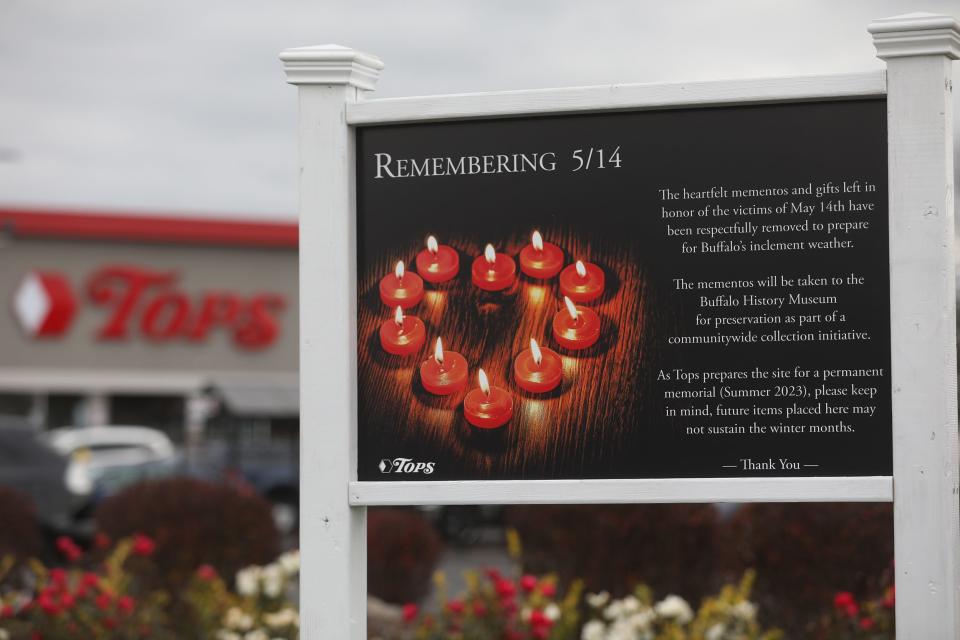Black Buffalo residents' trauma compounded in 2022: How culturally affirming care can heal
After 10 people were killed in a racially motivated shooting on Buffalo’s East Side in May 2022, local and national mental health organizations stepped in to offer support to the neighborhood's residents. Some have since left, but the Association of Black Psychologists (ABPsi) has remained, offering a culturally affirming form of counseling its leaders say has helped participants cope better than a traditional therapy setting.
Sawubona Healing Circles — the Zulu word loosely translates to “I see you" — are virtual group sessions in which participants collectively discuss their shared traumatic experience. They're held at least three times a week, and their leaders say participants have benefited from a structure drawing on traditional Black and African psychology principles like community, spirit and the connection.
“The community needed this kind of response," said ABPsi President Donell Barnett. "People come into a space where that experience is validated, that experience is seen, that it’s talked through and it also gives us an opportunity to give them culturally affirming coping skills that you normally don’t see in a traditional therapy setting."
Culturally affirming therapy focused on one message: 'I see you'
Sawubona Healing Circles were originally developed in response to COVID-19. By August 2022, the NYS Office of Mental Health had partnered with ABPsi to continue providing support for Buffalonians affected by the shooting. The New York State Office of Mental Health did not respond to multiple requests for comment.
In some parts of South Africa, the word "Sawubona" is a customary greeting, but for ABPsi, it's used a bit differently.
“We use the term in the sense that ‘I see your humanity, I see your culture, I see who you are as a person,’” Barnett said. “That resonates with a lot of people, particularly Black people and other minoritized communities in a world where people feel the sting of oppression, racism and economics.”
In a world that Barnett says often aims to render Black people invisible, Sawubona Healing Circles offer an affirming model of mental health and wellness.
“When you draw on a lot of principles that come out of the discipline of Black and African psychology, which emphasizes community, spiritness and the connections that we have with one another, it emphasizes our intergenerational connections from even our ancestors to now into the future,” he said.
Buffalo's East Side:What a neighborhood ravaged by a mass shooting reveals about the power of community
History:This housing project cemented segregation in Buffalo. Now, Black activists want to save it.
'The love is real': Young people's stories capture life growing up on Buffalo's East Side
How Sawubona Healing Circles work

Sawubona Healing Circles work to interrupt trauma responses at the root to keep people from developing unhealthy coping mechanisms, including paths leading to substance abuse. Put simply: to "see" them.
Because of the communal nature of the circles, people are not only talking about what they are experiencing and how they’re feeling, but they’re also creating bonds and networks of support with each other.
“There’s collective wisdom that comes from that, which is affirming,” said Tanie Lodge, psychologist and project lead with ABPSI Sawubona Healing Circles. “People feel more empowered to resist the impact of the racial trauma that’s happening. When we don’t have avenues to say, ‘Hey, this is racial trauma, this is how it’s impacting me, these are my responses and this is how I’m interacting with others,’ we internalize it. Internalizing it is what creates the psychological distress. That’s where you see the depression, the anxiety, the addiction, violence and things of that nature.”
Lodge says the process for handling racial trauma is a bit different from the way a trained psychologist might handle PTSD or anxiety. When participants report being afraid or hesitant to go into a grocery store due to the potential of experiencing a mass shooting there, their concern is rooted in the fact that such violence was enacted on their community.
“It’s not like it’s this farfetched thing, it occurred. So it’s reasonable that people have some ambivalence or might even be hypervigilant in a response to that," she said. "When you just think about everything that’s happened throughout the country, some of this fear (and) anxiety is reasonable.”
Prioritizing therapeutic approaches that 'speak to who they are'
In the wake of the Buffalo shooting, participants have also seen their racial trauma compounded by other racially motivated killings and continued systemic issues. Sawubona is guided by what people bring to each healing circle, and is working to help participants navigate both new and old, single-event and continuing traumas.
“We want people to reconnect with their spiritual selves," Lodge said. "We want them to reconnect with understanding what our ancestors did to help us stay grounded and move forward when we had these kinds of atrocities happen in our community throughout history.”

Lodge said many participants have found success in using rituals, affirmations and meditations, to help them feel “in order and not off balance."
Sawubona Healing Circles aren't covered by insurance or Medicaid, and you won't find them on any list of evidence-based practices because, Barnett says, "All of that has to do with systemic structures." He hopes their work will lead to more culturally affirming services as a part of the standard mental health service array.
"The country is ready and certainly BIPOC communities are ready for therapeutic approaches that really speak to who they are as a person."
Those interested in participating in a Sawubona Healing Circle and New York residents who would like to register for training to become a healing circle facilitator can sign up at abpsi.site-ym.com.
This article originally appeared on Rochester Democrat and Chronicle: After Buffalo Tops shooting, culturally affirming care helped heal

